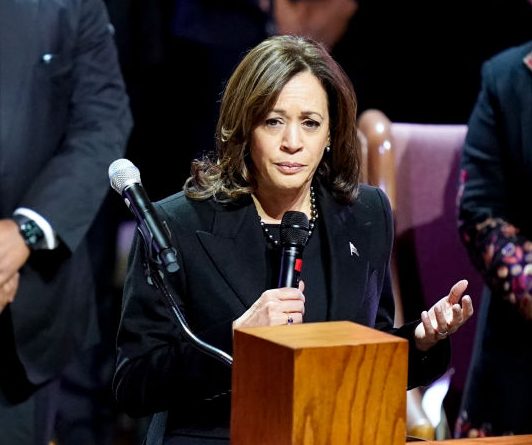
MEMPHIS, TN - FEBRUARY 01: Rev. Al Sharpton listens as US Vice President Kamala Harris speaks during the funeral service for Tyre Nichols at Mississippi Boulevard Christian Church on February 1, 2023 in Memphis, Tennessee. On January 7th, 29-year-old Nichols was violently beaten for three minutes by Memphis police officers at a traffic stop and died of his injuries. Five Black Memphis Police officers have been fired after an internal investigation found them to be directly responsible for the beating and have been charged with second-degree murder, aggravated assault, two charges of aggravated kidnapping, two charges of official misconduct and one charge of official oppression. (Photo by Andrew Nelles-Pool/Getty Images)
Vice President Kamala Harris spoke at Tyre Nichols’ funeral on Wednesday and called for Congress to pass the “George Floyd Justice In Policing Act,” following Nichols’ tragic death at the hands of several members of the Memphis Police Department.
Harris demanded Congress to pass the act in front of a packed memorial service for Tyre Nichols at the Mississippi Boulevard Christian Church Wednesday afternoon.
“As a United States Senator, I co-authored the ‘George Floyd Justice In Policing Act.’ And as Vice President of the United States, we demand that Congress pass this act. Joe Biden WILL sign it, and we should not delay and we will not be denied. It is non-negotiable!” Harris said to widespread applause.
Nichols was a 29-year-old Black man who died due to police brutality during a traffic stop in Memphis last month.
Harris’ called for the passage of the George Floyd Act alongside a brother of George Floyd and the mother of Breonna Taylor, another Black person who was unjustly shot and killed by police officers in Louisville, Ky., in March 2020 during a botched raid on her apartment.
The George Floyd Justice in Policing Act of 2021 was a policing reform bill drafted by Democrats in the United States Congress. The legislation was introduced in the United States House of Representatives on February 24, 2021, according to the Washington Post.
The legislation aims to combat police misconduct, excessive force, and racial bias in policing.
The bill passed the Democratic-controlled House of Representatives on a mostly party-line vote of 220–212, but not the evenly divided Senate amid opposition from Republicans.
Negotiations between Republican and Democratic senators on a reform bill collapsed in September 2021.
In 2020, Congress passed the act through to the House with a vote of 236–18, however it was deemed dead in Committee.
In 2021, the act once again passed in the House with a vote of 220–212, however it’s latest Congressional status is “to be determined” at a later date.
The legislation has been endorsed by more than 100 civil rights groups, including the Lawyers’ Committee for Civil Rights Under Law, Leadership Conference on Civil and Human Rights, NAACP and NAACP Legal Defense and Educational Fund, National Urban League, Amnesty International, and National Action Network.
However, it has faced widespread opposition by police unions and other organizations representing police oppose the bill.
Such police organizations are quite influential in Congress, by exerting influence through campaign contributions, endorsements, and lobbying and advocacy efforts, and historically have been successful in stymieing reform legislation.